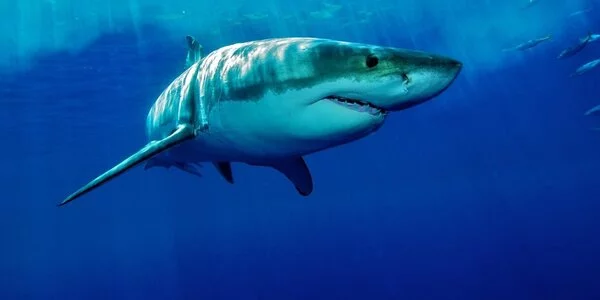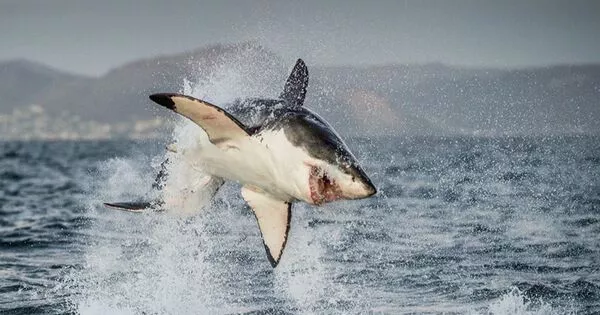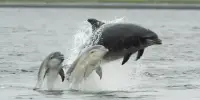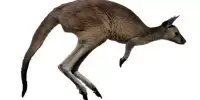Since 2017, a pair of Orca (Killer Whales) has terrorized and killed Great White Sharks off the coast of South Africa, driving a large number of the sharks away from their natural aggregation site. A new study published in the peer-reviewed African Journal of Marine Science uses long-term sightings and tagging data to show that Great Whites have been avoiding certain regions of the Gansbaai coast – territories that they have dominated for many years – for fear of being hunted by Orca ever since.
Following an Orca attack, eight Great White Sharks have washed up on shore since 2017. Seven of them had their livers and hearts removed. Their wounds are clearly caused by the same pair of Orcas, who are likely to have killed more (which haven’t washed up on the shore). It is widely assumed that other Orcas are capable of similar attacks. The findings lend support to the theory that sharks use their ‘flight’ sense of fear to trigger a mass emigration when their marine predator is nearby.
In this latest study, which lasted five and a half years, 14 sharks were tracked fleeing areas where Orcas were present, and visual sightings in certain Western Cape Bays have dropped dramatically. Gansbaai, about 100 kilometers east of Cape Town, was a world-renowned location for spotting this legendary shark, with tourists from all over the world visiting and participating in cage diving.
The research is particularly important, as by determining how large marine predators respond to risk, we can understand the dynamics of coexistence with other predator communities; and these dynamics may also dictate the interactions between competitors or intra-guild predator/prey relationship.
Alison Towner
Reporting on the findings, lead author Alison Towner, a Senior White Shark Biologist, at the Dyer Island Conservation Trust, says: “Initially, following an Orca attack in Gansbaai, individual Great White Sharks did not appear for weeks or months. What we seem to be witnessing though is a large-scale avoidance (rather than a fine-scale) strategy, mirroring what we see used by wild dogs in the Serengeti in Tanzania, in response to increased lion presence. The more the Orcas frequent these sites, the longer the Great White Sharks stay away.
“The research is particularly important, as by determining how large marine predators respond to risk, we can understand the dynamics of coexistence with other predator communities; and these dynamics may also dictate the interactions between competitors or intra-guild predator/prey relationship.”
Alison is a PhD student at Rhodes University in Makhanda, Eastern Cape. She is originally from Lancashire in the United Kingdom. She lives in Gansbaai and has spent the last 15 years studying Great White Sharks and learning about their movement patterns through tagging data. She has previously described the area as “simply special, in terms of marine life — few places compare to this truly diverse and beautiful area.” She is frequently found on a boat and has witnessed many massive Great White Sharks.
Prior to the Great White Shark predation, there were only two instances in Gansbaai where they were absent for a week or more: one week in 2007, and three weeks in 2016. So, what Alison, and other colleagues at institutions she represents such as Marine Dynamics Academy, have recently witnessed first-hand (by physically retrieving the carcasses of attacked sharks — as pictured) is this new absence is unprecedented for the area.

“It has triggered the emergence of a new mesopredator to the area, the Bronze Whaler Shark — which is known to be eaten by the Great White Shark — and these Bronze Whalers are also being attacked by the Orcas, who are indicating a level of experience and skill in hunting large sharks,” she says. However, balance is critical in marine ecosystems. For example, in the absence of Great White Sharks, Cape Fur seals can predate on critically endangered African Penguins or compete for the small pelagic fish they eat.
That’s a top -down impact, we also have ‘bottom up’ trophic pressures from extensive removal of Abalone, which graze the kelp forests these species are all connected through. To put it simply, although this is a hypothesis for now, there is only so much pressure an ecosystem can take, and the impacts of Orcas removing sharks, are likely far wider-reaching. But, what drew the pair of Orcas, easily recognizable by their distinctive collapsed dorsal fins, to this new territory?
Other, yet-to-be-published data suggests that Orcas are becoming more common in South African coastal regions, and this pair could be members of a rare shark-eating morphotype known to hunt at least three shark species as a primary source of nutrition in South Africa.
“We know that Great White Sharks face their highest targeted mortality in anti-shark bather protection nets in KwaZulu Natal, and they simply cannot afford additional pressure now from Orca, killer whale predation,” Alison says.
What it means for populations of the Great White could be more pronounced and it is “unclear” what the pressure may do, Alison states.
“The Orcas are targeting subadult Great White Sharks, which can further impact an already vulnerable shark population owing to their slow growth and late-maturing life-history strategy. Increased vigilance using citizen science (e.g. fishers’ reports, tourism vessels), as well as continued tracking studies, will aid in collecting more information on how these predations may impact the long-term ecological balance in these complex coastal seascapes.”
Alternative explanations for the findings, as with all studies, should be considered. The authors speculate that sea surface temperature may have played a role in the Great White’s recent absence, but “the immediate and abrupt decline in sightings at the beginning of 2017 and the extended and increasing periods of absence cannot be explained.”
“Other potential explanations for a decline at Gansbaai include direct fishing of Great White Sharks or the indirect effect of fishery-induced declines in potential prey,” they write. They do, however, state that while this may “potentially contribute to an overall decline in the number of Great Whites in South Africa,” it is “unlikely to explain the sudden localized decline.”
















